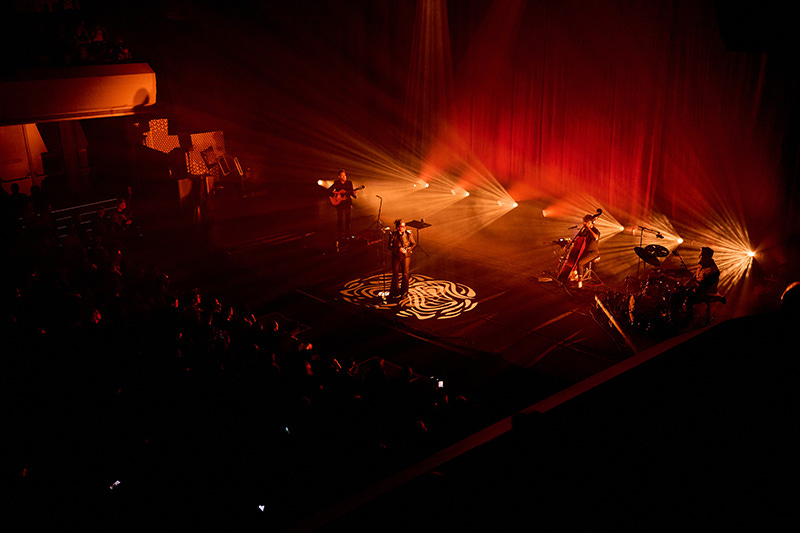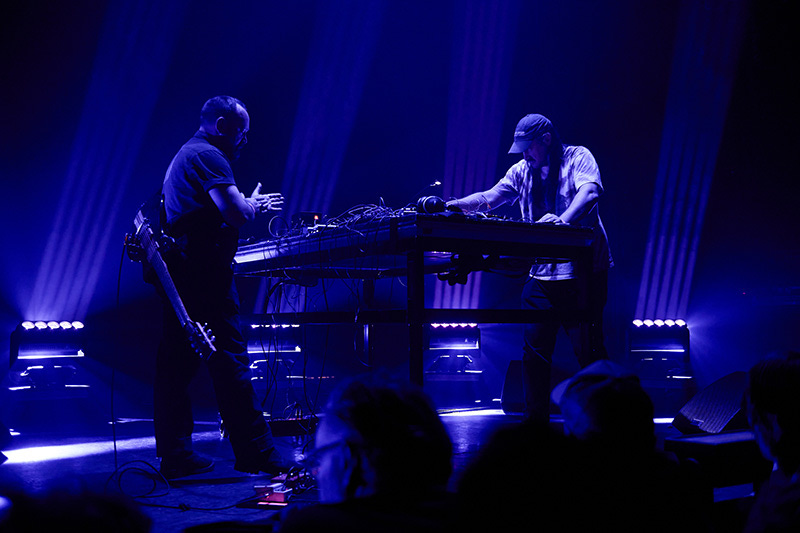Mindfulness in The Hague
How Rewire, Europe’s premium experimental festival, forced an anxious Londoner to address his FOMO, via a low-grade existential crisis
Go to The Hague and I bet the first thing you notice is how relaxed everyone is. It's almost unnervingly so for someone accustomed to the constant low-level tension of London. Everyone here seems so figured out. You can see it in the way they navigate the pristine bike lanes, as if it were choreographed, and in how they order their bitterballen without hesitation. There’s an efficient, matter-of-fact quality, from the grand buildings to the neat canals reflecting the gabled houses. For someone used to maneuvering through the city in a state of anxiety, with my internal GPS constantly recalculating based on the fear of missing out – a better coffee, a cooler bar, the ‘right’ life path – being in a place that appears so outwardly organised only throws my internal chaos into sharp relief.
I’m here, subjecting myself to this brutal sense of orderly calm, because of Rewire, an annual festival that has been kicking off the European festival season since 2011. For a town known for its down-to-earth practicality, the idea of a festival that essentially celebrates music in its most conceptual forms feels out of place. This year’s lineup is characteristically experimental, vast and excellent: a series of punishing noise sets transitioning into intricate jazz improvisations, followed by deconstructed club tracks that sound like malfunctioning machinery, and then perhaps some heartbreakingly delicate folk music. This kind of lineup gets the music nerd in me buzzing while simultaneously evoking a deep sense of inadequacy. Perhaps that's why I approach festivals with the fervor of a crazed trophy hunter. The idea is to treat this whole thing like a complementary hotel buffet; wolf down as much as I can before they call time and take all the scrambled eggs away. The way to achieve it is brutally simple. Stop for nothing, plan for efficiency, and maximise output.
Reality, as always, makes a habit of ruining everything. My naive vision of effortlessly drifting between venues collides with the reality of Rewire’s distributed setup: clubs, theatres, churches – each with its own bouncer, capacity limits, and one-in-one-out policy when things get busy. The queues turn into slow-motion grinds of collective frustration, punctuated by the muffled thud of music we can’t hear. My meticulously planned schedule? Defeated by logistics and door policies. Standing outside a packed PRAAD, painfully aware of an ‘essential’ act starting elsewhere, I have a realisation: this isn’t just fear, it's a defense mechanism. A way for overloaded minds to avoid the daunting responsibility of actually choosing one option over another. You try to keep all options open, and in the end you end up experiencing nothing but a frantic, joyless chase.
As a result, the music I do catch on Friday feels like channel-surfing. OKLou’s electronic pop is polished and competent, but maybe a bit too frictionless for my jagged mood. YHWH Nailgun, though, is right on brief – raw, glorious no-wave noise, pure catharsis, and proper intensity. We dither somewhere, and miss Kassie Krut entirely (over-optimism claims another victim). Eventually, we stumble into MC Yallah and Debmaster’s set in the smaller of PRAAD’s two rooms, and the night briefly sparks into life. Pure energy, zero pretension, turning the room into a sweaty, happy mess. The last band we caught was AKA HEX (the Aïsha Devi & Slikback project). Looking back, my notes aren't kind – ‘kind of shit... bit too creepy manga for my tastes.’ Their intense sound, combined with the visuals just rubbed me the wrong way, but that could've been the frustration talking.
Clearly, another approach is needed. Staring down another schedule dense with potential regret, I make a radical decision: pick a lane, stay in it, and be present. Amare, the city's cavernous concert hall, is where this new plan starts. Walking into the main auditorium for Arooj Aftab is like entering a decompression chamber. Her voice is so cut glass it’s astonishing – delivering these sparse, devastating songs that demand you stare and listen. She’s funny too, at one point threatening to buy the whole crowd shots so that they can enjoy a fun song. Embracing our new philosophy, we stay put – a decision that leads directly to organist Anna von Hausswolff. Where Aftab was refined, von Hausswolff is elemental. She commands the massive space like some gothic sorceress, building overwhelming waves of sound that are genuinely overpowering – music as a physical force. Later, we catch billy woods, whose dense, literate hip-hop and observational lyricism feels like reading someone's intensely personal diary set to beats. The night ends not with a panicked sprint but a decent whisky sour in a quiet bar.
The strategy remains effective for Sunday. We catch Panda Bear in the main room at PRAAD, an unexpected hit of warped, sun-drenched psychedelia – think the Beach Boys reimagined through an early Warp Records lens. In contrast, caroline, who perform just around the corner afterward, are less convincing for some reason. While certainly delivering an atmospheric show, their brand of experimental folk comes across as overly self-conscious. A little later, Portland noise duo Yellow Swans deliver a visceral noise set, but not before Pete Swanson addresses the audience. His voice is thick with emotion as he speaks about the lasting impact of the Holocaust and its terrifying relevance to the actions taken by the new Trump White House. Soon after, the whiplash comes from another duo (this one from Chicago), Angry Blackmen, whose pure, explosive energy and relentless ambition culminate in an impassioned sermon about self-belief and the grind.
Looking back with a few days’ distance, it’s ironic that sometimes it takes being a stranger to learn about yourself. For me, at least, Rewire kind of acted as a perverse kind of mindfulness retreat: a state of zen delivered via a one-in-one-out policy. The Hague, with its orderly streets and laid-back residents, seems almost designed to induce a low-grade existential crisis in anyone accustomed to overflowing bins, constant Outlook Calendar reminders and buzzing work Signal Groups. In retrospect, even attempting to apply this hustle culture mindset to a gloriously chaotic festival feels almost comical. The sheer impossibility of seeing everything forces you to confront how the “fear of missing out” isn’t merely a millennial marketing buzzword but a deeply ingrained, somewhat pathetic operating system that can sabotage the experiences you’re trying to enjoy.
So yeah, as it turns out, trying to consume culture through a meticulously colour-coded schedule might not be all it’s cracked up to be.








Dominic kind of describes my experience at any festival here and I’m glad that I’m not alone.